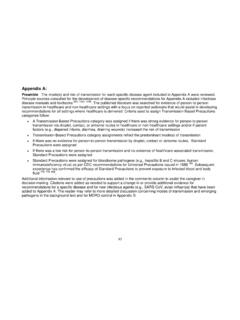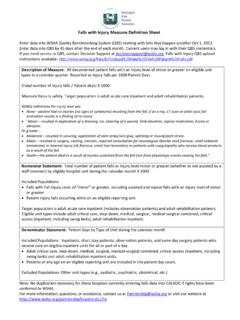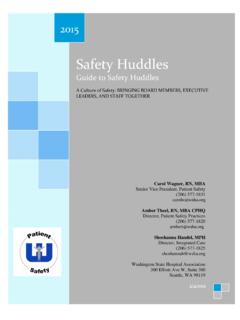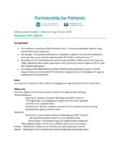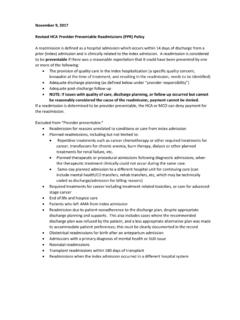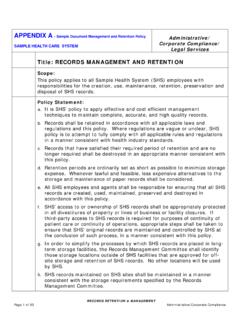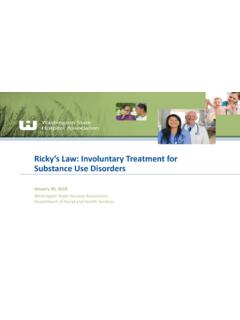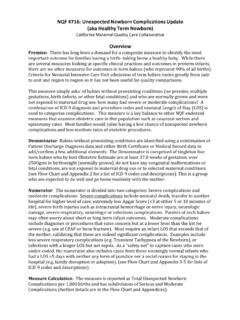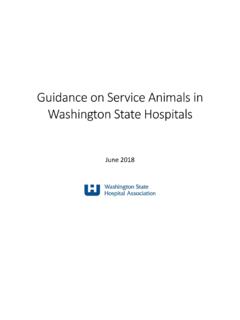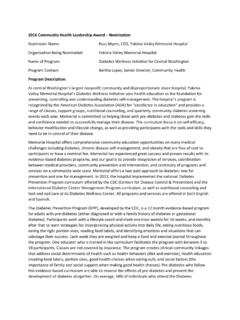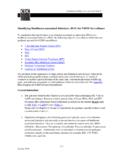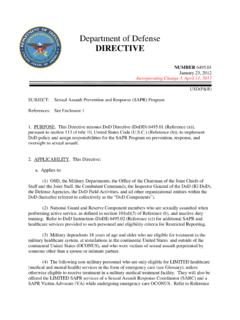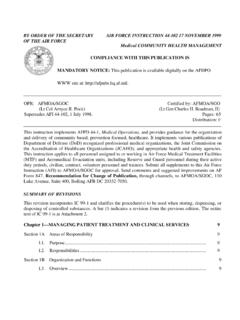Transcription of Chapter 2A: Consent to Healthcare Rules - WSHA Home Page
1 Washington Health Law Manual Fourth Edition Washington State Society of Healthcare Attorneys (WSSHA). Chapter 2A: Consent to Healthcare General Rules Author: Barbara Shickich, JD. Organization: Riddell Williams, Author: Sarah Joye, JD. Organization: Riddell Williams, Editor: Heath Fox, JD. Organization: Lewis, Brisbois, Bisgaard & Smith, LLP. Copyright 2016 Washington State Society of Healthcare Attorneys and Washington State Hospital Association. All rights reserved. Disclaimer: This publication is designed to provide accurate and authoritative information with respect to the subject matter covered. It is provided with the understanding that neither the publisher nor any editor, author, or contributor hereto, is engaged in rendering legal or other professional services. The information contained herein represents the views of those participating in the project, and not, when applicable, any governmental agency or employer of such participant.
2 Neither the publisher, nor any editor, author, or contributor hereto warrants that any information contained herein is complete or accurate. If legal advice or other expert assistance is required, the services of a competent licensed professional should be sought. For reference purposes, this Chapter was prepared from laws, cases, and materials selected by the authors, which were available as of April 30, 2016. Biographies Barbara Shickich, JD, Author Barbara Shickich is a Principal at Riddell Williams where she heads the Health Care practice group. Barbara has been practicing health care law since 1980, often serving her clients in the role of general counsel. She provides a full range of health care business advice, including formation and operation, nonprofit and tax exempt status, governance, federal, state and local regulatory and compliance issues, and business transactions, including joint ventures and mergers and acquisitions.
3 Since 1993 she has authored updates and revisions to the Consent Manual published by the Washington State Hospital Association. Sarah Joye, JD, Author Sarah Joye is an Associate at Riddell Williams in the Corporate and Health Care practice groups. Sarah counsels health care providers on federal, state, and local regulatory compliance and transactional issues. She also has experience representing clients in professional disciplinary proceedings and state and federal appeals involving health care issues. Heath Fox, JD, Editor Heath Fox is a Partner at Lewis, Brisbois, Bisgaard & Smith, LLP, in the Health Care Practice Group. He has a civil litigation practice emphasizing medical negligence defense, licensing, health care law, products liability and guardianship. He is admitted to practice in the State of Washington, the State of Oregon, District Court for the Western District of Washington, and the Ninth Circuit Court of Appeals.
4 He is also an active member of the Washington Health Care Risk Management Society. Chapter 2A: Consent to Healthcare General Rules (prepared from reference materials available as of April 30, 2016). Chapter Outline Part A Summary .. 2A-2. Why is Consent Required? .. 2A-2. What is Consent ? Battery Negligence Theory Responsibility to Obtain Consent .. 2A-3. Health Care Provider Hospital or Other Health Care Facility Washington Department of Health (DOH) Regulations Washington Department of Social and Health Services (DSHS) Regulations Joint Commission Requirements Medicare and Medicaid Conditions of Participation Types of Consent .. 2A-6. Implied Consent Express Consent Elements of Informed Consent .. 2A-7. Statutory Requirements Information Which Must Be Disclosed Information Which Need Not Be Disclosed Scope of Consent General Consents Consent to Specific Procedures Length of Time Consent Is Valid Use of Interpreters or Translators Proof of Consent (Documentation).
5 2A-12. Written Consent Oral Consent Who May Give 2A-14. Legal Capacity Adults Minors-Generally Mental Capacity Substituted Consent Refusal or Withdrawal of Notice .. 2A-16. Adults Minors When Consent is Not Necessary .. 2A-17. Medical Emergencies Medical Holds for Minors Therapeutic Privilege Patient Request Not to Be Informed Consent Litigation .. 2A-19. Elements Material Fact Causation Proximate Cause Burden of Proof Expert Testimony Defenses Statute of Limitations Washington Health Law Manual Fourth Edition 2A-1. Volume 1: Patient Care Information, Treatment and Rights Part A Summary This part of the Chapter provides a general overview of the issues which pertain to Consent to medical treatment. 1 It provides a foundation for the special Consent Rules set forth in Part B, and the decision making for incompetent patients set forth in Part C.
6 This Part A should be read in conjunction with those other Parts. Part A explains the basis for the requirement to obtain informed Consent to treatment, who must obtain the Consent , and types of Consent . The elements of informed Consent are described, as well as who may give Consent , refusal or withdrawal of Consent , and when obtaining Consent is not necessary. Various aspects of Consent litigation are also explained. Why is Consent Required? Hospitals and other health care providers have a responsibility to patients to provide competent health care. Inherent in that responsibility is an obligation not to violate the substantial personal and property rights of the patient that might be affected by health care. Fundamental among these rights is the right of persons to decide what happens to their bodies. The concept is that [e]very human being of adult years and sound mind has a right to determine what shall be done with his own body 2 This premise has been recognized by courts in Washington since 1970.
7 3 It has been acknowledged by the legislature since its adoption of RCW in 1975. Consent is required to give function to this right to self-decision. The failure to obtain Consent is an abrogation of the patient's right to self-decision and can lead to liability in tort. Tort liability can arise under two theories: the intentional tort of battery and negligence. What is Consent ? Consent is a process inherent in the relationship between the health care provider (usually a physician) and a patient. It involves a dialogue between them in which information is exchanged concerning the patient and the health care services or treatment being recommended. The patient relies on the health care provider to explain what the patient needs to know about the patient's body, the treatment proposed, the risks of the proposed treatment, and alternatives.
8 The health care provider relies on the patient to ask questions if the information provided is unclear or incomplete. Additionally, the health care provider relies on the patient to provide accurate and complete information about his or her history and symptoms. The Consent process includes elements of capacity, information, understanding and voluntariness. The patient must have the legal and mental capacity to make health care decisions. The patient must be provided with adequate information to enable the effective exercise of the patient's right of self-decision. The information provided by the health care provider must be in terms and language the patient can comprehend, taking into consideration the patient's education and language capabilities. Additionally, the patient must understand that the decision is the patient's to make and must understand what that decision entails.
9 The discussion between the health care provider and the patient must take place in an environment free from coercion, duress, or undue influence. 1. This Chapter draws heavily on the information set forth in the Washington State Hospital Association Consent Manual. The Consent Manual provides a convenient tool for ready retrieval by hospital administrators and personnel of the consents and releases with which they must deal in their day-to-day operations. It includes general information regarding consents and releases with sample forms. 2. Justice Cardozo in Schloendorff v. Society of New York Hospital, 211 125, 129, 105 92 (1914), overruled on other grounds in Bing v. Thunig, 2 656, 143 3, 163 3 (1957). 3. Watkins v. Parpala, 2 Wn. App. 484, 490-91, 469 974, rev. denied, 78 995 (1970). 2A-2 Washington Health Law Manual Fourth Edition Chapter 2A: Consent to Healthcare General Rules (prepared from reference materials available as of April 30, 2016).
10 Informed Consent is, however, more than the signing of the form. Frequently the Consent process is documented through the use of a Consent form. The form, which is signed by the patient, should set forth the elements of the dialogue between the health care provider and the patient to the extent necessary to demonstrate that the patient has received adequate information to effectively exercise the right to self-decision. Battery In light of a patient's right to determine what should be done to his or her body, medical treatment undertaken without obtaining Consent may result in a battery the touching of another person without implied or express Consent . The performance of an operation without first obtaining any Consent thereto may fall within the concepts of assault and battery as an intentional tort.. 4 This theory is valid in Washington now only where treatment is performed in the absence of any Consent at all.
